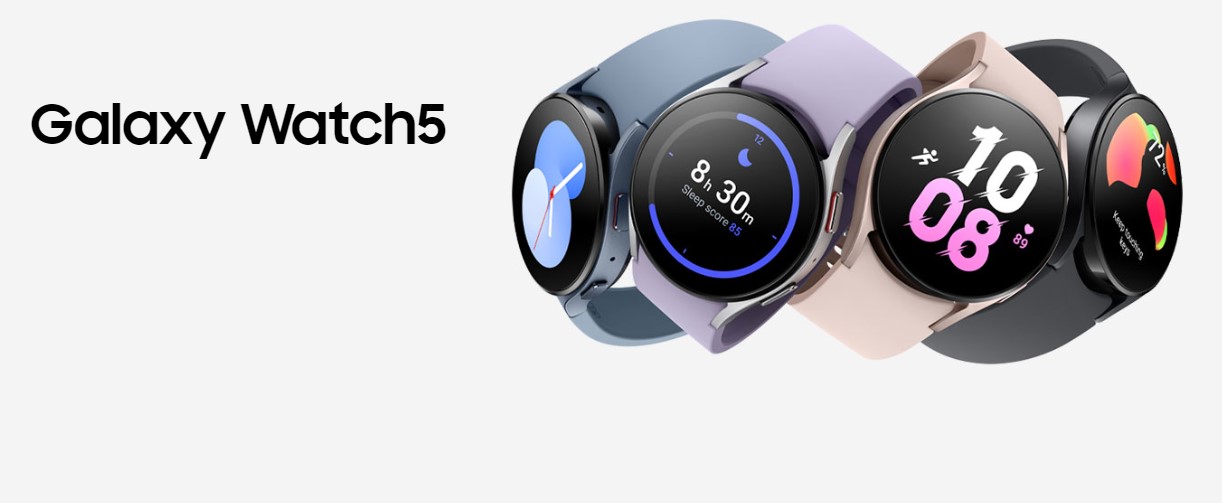Gadget of the Week
Gadget of the Week: Watch5 catches up to fitness tech
The Samsung Galaxy Watch5 keeps up with the race for fitness technology, writes ARTHUR GOLDSTUCK.
What is it?
The Samsung Galaxy Watch5 combines cutting edge smart watch functionality with the demands of the wellness revolution in technology.
At the heart of the high-tech advances on the watch5 is Samsung’s BioActive Sensor, which it says w“drives the next era of digital health monitoring”, first introduced on the Galaxy Watch4 series.
The BioActive Sensor uses a single chip that combines three health sensors: Optical Heart Rate, Electrical Heart Signal and Bioelectrical Impedance Analysis. These combine to deliver readings that include heart rate, blood oxygen level, blood pressure, and ECG, as well as stress levels.
The real innovation here is not the chip itself, but something as practical as an increased surface area for the sensors. This allows for more direct contact between the sensors and the wrist, meaning it is able to track health metrics with greater accuracy than its predecessor.
As a result, at almost every level, the Watch5 competes directly with the flagship fitness devices form Fitbit, like the Sense 2, which focuses intensively on wellness, sleep insights and stress management. And, as with the Sense, the Watch5 delves into the sphere of the post-workout, rest, and recovery process, through monitoring post-cardio heart rate, and making recommendations on water consumption based on sweat loss.
A Body Composition measurement tool offers a broad perspective of a user’s overall health, and comes up with a tailored approach to setting and achieving goals.
Sleep seems to be the main battlefront of fitness devices right now, and Samsung brings in an arsenal of weaponry for better sleep. Sleep Scores monitor stages of sleep, along with snore detection and blood oxygen levels. Sleep Coaching provides a tailored month-long guided program.
Samsung offers one thing that Fitbit cannot yet – although its acquisition by Google suggests an equivalent may be in its future: SmartThings integration. Did I say one thing? Make it several. This feature allows the watch to set, automatically, connected lights, air conditioners, and TVs.
It offers extensive app support, with the likes of Spotify music, Soundcloud, Deezer, and Google Assistant voice control built in. Google Maps, without a smartphone connection, has also been promised as an upcoming feature. It uses Samsung’s One UI Watch4.5 operating system, which improves on-wrist typing and making calls.
Fall detection allows an emergency contact is notified if the user falls.
The screen is highly durable, featuring a Sapphire Crystal display, which offers a harder outer layer, making it more scratch resistant in active outdoor use than most of its alternatives.
There is one major shortcoming that prevents the device from competing more aggressively with its equivalents from other brands: battery life.
Ironically, it comes with a 13% larger battery than its predecessor, but that lasts just a day. In its defence, says Samsung, it provides eight hours of sleep tracking with just eight minutes of charging – a large 30% faster than the Galaxy Watch4.
What does it cost?
Recommended retail price of the 40mm version of the Galaxy Watch5 is R5,999, and the 44m version comes in fromR6,499.
Why does it matter?
Dr TM Roh, president and head of the Mobile eXperience Business at Samsung Electronics, puts it this way: “We’re dedicated to giving our Galaxy Watch community the tools, data and resources needed to not only understand their overall health and wellness better, but to coach them on their journey. With Samsung’s ground-breaking BioActive Sensor, we’re empowering users with our most complete picture of health-related insights yet.”
What are the biggest negatives?
· Battery life: one day? Say it ain’t so!
· Google Maps was promised as a later update, suggesting the device was rushed out before all intended apps could be integrated.
· It plays catch-up with its competitors, rather than leading the way.
What are the biggest positives?
· Sleep coaching takes the sleep monitoring trend into a practical realm.
· Accurate vital sign measurements.
· SmartThings integration, meaning it becomes part of the smart home experience.
* Arthur Goldstuck is founder of World Wide Worx and editor-in-chief of Gadget.co.za. Follow him on Twitter on @art2gee

















